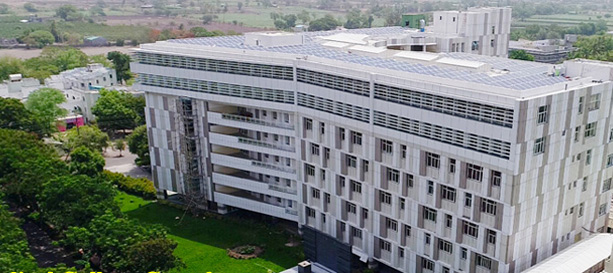
Dr. Balasaheb Vikhe Patil Rural Medical College
The objective of the Institute is to lay a foundation and create advanced academic and research environment for medical and other health science manpower that would identify and deal effectively with peculiar problems faced in implementing a comprehensive rural health care package in the country. Appropriate, relevant and up-to-date knowledge and skills are made available to grass roots level community members to post doctoral research workers in medical and health sciences.The Institute has emerged as an alternative to traditional medical and health care programs through internationalization, innovation in academic and research studies and attained Deemed University status in 2003.

There are five main study programs with in the PIMS: medicine, dentistry, physiotherapy and rehabilitation, nursing, and para-medical (medical laboratory technology, x-ray technology, dental technology, and dental hygiene).
These programs gain insights into each other's skills and abilities.
To promote a team attitude among health care professionals in a unified group all the programs are offered in a single campus. At present the only one of its kind in India. Medical Program
The Dr. Balasaheb Vikhe Patil Rural Medical College since its inception in 1984 - first of its kind in India, is dedicated to serving society as a center of excellence with emphasis on socially meaningful medical education, research and health care.
It was the culmination of determined efforts of Shri Balasaheb Vikhe Patil. The idea was to provide an opportunity to the rural meritorious children to become quality, appropriate and need based health providers in their own environment.
Added advantage was improved accessibility of tertiary and critical care to the rural poor.

The college offers undergraduate course in medicine (M.B.B.S) and postgraduate degree (M.D/M.S) and diploma programmes in 20 medical disciplines. The sanctioned annual intake to the M.B.B.S programme is 125. The courses offered is a perfect blend of community oriented, problem based learning with high quality clinical reasoning.
The college was permanently affiliated to Maharashtra University of Health Sciences, Nashik as well as University of Pune till it became a constituent unit of this University in 2003. The College as well as the undergraduate and postgraduate course offered was recognized by Medical Council of India. They are also recognized by General Medical Council, U.K and listed by World Health Organization, Geneva. The College has promoted international collaborations in all the thrust areas - medical care, education and research.

Pioneer in Problem Based Learning (PBL)
The College is a pioneer in the country to introduce Problem-Based Learning (PBL) in undergraduate medical programme. The PBL curriculum is being developed and implemented under the guidance and collaboration of Faculty of Health Sciences, Linkoping University, Sweden. College Faculty has undergone training in PBL at Linkoping. Educational experts from Linkoping regularly visit the institute to conduct workshops/training programmes for the Faculty.
The institute has been in the process of blending the ongoing teaching methods such as Community Oriented Medical Education (COME), integrated teaching, micro teaching, and project based learning, into the PBL. The institute is planning to extend the PBL to other health sciences programs like dentistry, physiotherapy, nursing and para-medical.
Focus on Community Oriented Medical Education
To understand the peculiar nature of the problems encountered while delivering health care services to the rural masses, it is very important to look beyond the medical sciences and employ an integrated approach.
Community & Academic Partnership (CAP) Programmes
They are aimed at fostering health and promoting partnership between communities and faculty associated by students to build each other's strength, confidence as well as capabilities. The programmes includes allotting five families from adopted villages to each student to study during the entire course, celebrating all the public health and socially important occasions like World Health Day, World Women's Day etc, in the villages and involve community and students in all epidemiological and other health projects/surveys.

Learning through attending "Out-reach" programmes
A group of students from each faculty are attached to regular "out-reach" programmes in far-flung areas, organized in partnership with local community and public health staff, to learn socio-clinical aspects of the patients. Students are also involved in health education and social communication activities during the camps.
Project based studies & surveys
Need based selection of the topics is done by students such as HIV/AIDS, health problems of migratory workers etc. Students and community are also involved in epidemiological surveys like investigation of the hepatitis epidemic, gastro-enteritis epidemic and various projects involving the public health staff.
Learning at Peripheral Health Centres
Students assigned to each faculty are taken to peripheral health centres including PHCs and other Primary Care Clinics to impart training and skills while examining the patients. Students posted to the Department of Community Medicine learn aspects related to environmental, social, cultural, economic factors influencing the health of the community.

Extended home care and learning Program
The students along with the teachers visit houses of chronically ill patients to provide extended home care and study the cases. It provides an opportunity for the students to learn the subject in home settings.
Education, Communication and Media Center (ECMC)
The Institute has promoted a well-equipped ECMC to facilitate conducting advanced presentation methods with the support of educational, media and information technology. The Center is equipped with advanced computer systems with Internet and Multi-media projection systems like LCD Projectors, VCD Players, Digital Cameras and necessary software for preparation of Computer slides, CDs etc.
Medical Education Unit (MEU)
For Details click here....

